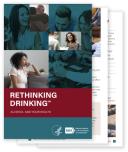Recent advances in treatment of alcohol use disorder (AUD) have provided more choices for patients and health care professionals. In addition to the summary below, you can visit the NIAAA Alcohol Treatment Navigator® to learn more and search for evidence-based treatment options near you. Evidence-based AUD treatment settings come in many forms and include:
- Outpatient—regular office, virtual, or telehealth visits for counseling, medication support, or both
- Intensive outpatient or partial hospitalization—coordinated outpatient care for complex needs
- Residential—low- or high-intensity programs in 24-hour treatment settings
- Intensive inpatient—medically directed 24-hour services, and may manage withdrawal
The NIAAA Alcohol Treatment Navigator®
The NIAAA Alcohol Treatment Navigator™ is a one-stop resource for learning about treatment, how to recognize high-quality treatment providers, and how to search several national directories of treatment programs and specialists.
Medications to treat alcohol use disorder (AUD). The U.S. Food and Drug Administration has approved three medications for treating AUD: naltrexone, acamprosate, and disulfiram.
Naltrexone and acamprosate can help a person quit drinking by offsetting changes in the brain caused by AUD. Disulfiram works by causing unpleasant reactions when a person drinks while taking this medication. None of these medications is addictive. They can be combined with mutual-support groups or behavioral treatments. See Help Links for more information.
Behavioral treatments. Research has shown that behavioral treatments, including cognitive-behavioral therapy, motivational enhancement, marital and family counseling, or a combination of approaches, can be very effective in treating AUD.
Getting help in itself appears to be more important than the particular approach used, as long as it offers empathy, avoids heavy-handed confrontation, strengthens motivation, and provides concrete ways to change drinking behavior. Visit the NIAAA Alcohol Treatment Navigator® for information about finding a treatment provider, or see Help Links for a list of organizations to help you find a psychiatrist, psychologist, social worker, or other treatment professional.
Feeling depressed or anxious?
It's common for people with alcohol problems to feel depressed or anxious. Mild symptoms may go away if you cut down or stop drinking. See a doctor or mental health professional if symptoms persist or get worse. If you're having suicidal thoughts, call your health care provider or go to the nearest emergency room right away. You can call or text the 988 Suicide & Crisis Lifeline or chat at 988lifeline.org. Effective treatment is available to help you through this difficult time.
Information about depression, anxiety, and other mental health topics is available from the National Institute of Mental Health.



